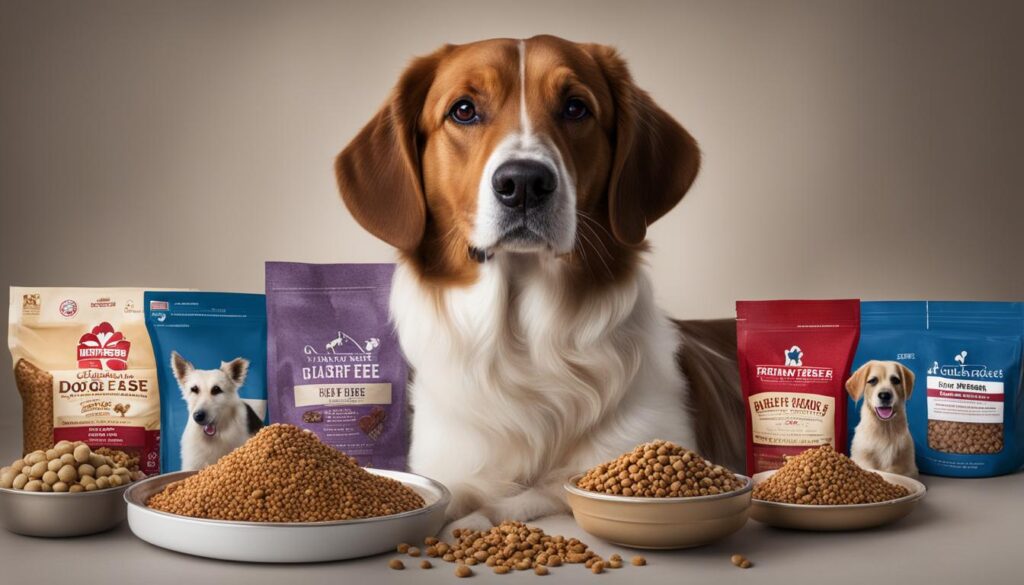Welcome to the exciting world of canine nutrition! In this article, we’ll dive into the latest breakthroughs and discoveries in dog diet research. From debunking myths to uncovering hidden truths, we’ll explore the cutting-edge science that is shaping the way we feed our furry friends. So, grab a cup of coffee and get ready to learn about the current research in dog nutrition. You might be surprised by what you discover!
Key Takeaways:
- Advances in canine nutrition research are revolutionizing how we understand the relationship between diet and dog health.
- Current research in dog nutrition is uncovering the true cost of home-prepared pet diets and the impact of dietary management on dogs with acute colitis.
- Breakthrough studies are shedding light on the potential role of preserved forage in protecting horses against equine gastric ulcer syndrome.
- Cautions are being raised about feeding bread-based treats to horses and ponies with equine metabolic syndrome.
- Stay tuned for the future of canine nutritional research, including personalized nutrition and the use of genetic testing to tailor diets to individual dogs’ needs.
The Link Between Grain-Free Dog Food and Dilated Cardiomyopathy (DCM)
It’s no secret that the food we feed our dogs plays a crucial role in their overall health and well-being. However, recent reports have raised concerns about the potential link between grain-free dog food and a serious heart condition known as Dilated Cardiomyopathy (DCM). The FDA has reported cases of dogs developing DCM after consuming grain-free pet foods, leading to investigations and further research.
DCM is a condition in which the heart enlarges, weakens, and becomes less effective at pumping blood. While DCM can affect any dog, certain breeds such as the Doberman pinscher and the golden retriever are especially vulnerable to this condition. It has been found that a deficiency in certain nutrients, particularly taurine and L-carnitine, can contribute to the development of DCM.
“Studies have shown that dogs fed a diet high in peas exhibited DCM-like changes in their hearts.”
The FDA has identified a potential link between DCM and high levels of peas, lentils, and potatoes in grain-free dog foods. In fact, studies have shown that dogs fed a diet high in peas exhibited DCM-like changes in their hearts. While the exact mechanism behind this link is still unknown, it is advised to avoid dog foods with high levels of peas and other similar ingredients.
As a dog owner, it is important to stay informed about the latest research and consult with your veterinarian when making decisions about your dog’s diet. They can provide personalized guidance based on your dog’s specific needs and help you navigate the complex world of pet food to ensure the best possible nutrition and health for your furry friend.

The Link Between Grain-Free Dog Food and DCM: What You Need to Know
To summarize, there is a growing concern regarding the potential link between grain-free dog food and Dilated Cardiomyopathy (DCM). Although the exact cause is still unknown, studies have shown that high levels of peas, lentils, and potatoes in grain-free dog foods may contribute to the development of this serious heart condition. Breeds such as Doberman pinschers and golden retrievers are particularly at risk.
It is important to carefully consider the ingredients in the dog food you choose and consult with your veterinarian for personalized guidance. While grain-free diets may be suitable for some dogs, it is crucial to ensure that they receive a balanced and nutrient-dense diet to support their overall health and reduce the risk of DCM.
| Grain-Free Dog Food | Traditional Dog Food | |
|---|---|---|
| Pros |
|
|
| Cons |
|
|
New Research Findings on Pulse Ingredients in Dog Food
Recent research from the University of Guelph has shown that pulse ingredients, such as lentils, beans, and peas, are safe for healthy dogs. The study found that dogs fed diets containing up to 45% whole pulse ingredients and no grains for 20 weeks showed no indications of heart issues and maintained lean body mass. This research provides reassurance for dog owners concerned about the effects of grain-free diets on their pets.
Pulses are considered an attractive protein source in pet foods, and this study supports their safety when incorporated at high concentrations. The benefits of pulses in dog diets go beyond their protein content. Pulses are rich in fiber, vitamins, and minerals, making them a nutritious addition to a dog’s diet. Additionally, pulse ingredients are more sustainable and environmentally friendly compared to traditional meat sources. Incorporating pulses into dog food helps reduce the ecological footprint of the pet food industry.
| Pulse Ingredient | Protein Content | Fiber Content | Vitamin Content | Mineral Content |
|---|---|---|---|---|
| Lentils | 24% | 11% | Vitamin A, C, K | Iron, Potassium |
| Beans | 22% | 8% | Vitamin B6, Folate | Manganese, Magnesium |
| Peas | 20% | 7% | Vitamin B1, B2, K | Phosphorus, Zinc |
It is important to note that while pulse ingredients are generally safe for dogs, individual sensitivities or allergies may exist. If your dog has specific dietary restrictions or health concerns, consulting with a veterinarian is recommended to determine the best diet for your pet’s unique needs. A professional can provide guidance on proper portion sizes and ensure a well-balanced diet.
The Role of Fiber in Dog Nutrition
When it comes to your dog’s diet, fiber plays a crucial role in maintaining their overall health and well-being. Fiber is a type of complex carbohydrate that cannot be digested by dogs’ bodies, but it provides many benefits to their digestive system and overall health. Fiber in dog diets can come from different sources, including fruits, vegetables, and grains. It is important to ensure that your dog is getting an adequate amount of fiber in their diet to support optimal digestion and promote overall canine health.
One of the key effects of fiber on canine health is its ability to promote regular bowel movements and prevent constipation. Fiber adds bulk to the stool, making it easier for dogs to pass and reducing the risk of digestive issues. Additionally, a high-fiber diet can help regulate blood sugar levels in dogs with diabetes, as it slows down the absorption of glucose from their food.
The importance of fiber in pet food extends beyond digestion. Fiber also has the ability to promote satiety, helping your dog feel full and satisfied after meals. This can be particularly beneficial for dogs on weight management diets or those prone to overeating. Additionally, certain types of fiber, such as soluble fiber, can help lower cholesterol levels and improve cardiovascular health in dogs, just as it does in humans.
The Role of Soluble Fiber in Canine Nutrition
One type of fiber that deserves special attention is soluble fiber. Soluble fiber dissolves in water and forms a gel-like substance in the intestines. This gel-like substance can help slow down the digestion process, resulting in a slower release of glucose into the bloodstream. Soluble fiber also acts as a prebiotic, providing fuel for beneficial gut bacteria and promoting a healthy gut microbiome. By supporting the growth of beneficial bacteria, soluble fiber helps maintain a balanced and healthy digestive system in dogs.
| Fiber Type | Food Sources |
|---|---|
| Insoluble Fiber | Whole grains, vegetables |
| Soluble Fiber | Fruits, legumes |
It’s important to note that while fiber is beneficial for dogs, excessive fiber intake can lead to gastrointestinal upset and nutrient deficiencies. It’s best to consult with your veterinarian to determine the right amount of fiber for your dog’s specific needs. Your vet can help you choose a pet food that provides a balanced and appropriate amount of fiber to support your dog’s overall health.
Innovative Ingredients and Formulations in Dog Food
When it comes to our furry friends, we want to provide them with the best nutrition possible. That’s why the field of dog food formulation is constantly evolving, with researchers and manufacturers exploring new ingredients and formulations to enhance canine nutrition. From insect protein to seaweed, and plant-based proteins like chickpeas and lentils, innovative ingredients are making their way into dog food formulas.
These novel ingredients offer alternative sources of protein, reduce environmental impact, and provide a variety of nutrients. For example, insect protein is not only rich in essential amino acids but also environmentally sustainable, requiring fewer resources to produce compared to traditional animal proteins. Seaweed, on the other hand, is packed with vitamins, minerals, and antioxidants that can support a dog’s immune system and promote healthy skin and coat.
Advancements in dog food technology have also led to the development of specialized formulas for specific health conditions. Hypoallergenic diets formulated with limited ingredient profiles can help dogs with food sensitivities or allergies. Joint support formulas enriched with glucosamine and chondroitin can aid in maintaining healthy joint function in aging dogs. These formulations cater to the unique needs of individual dogs, ensuring they receive the appropriate nutrition for optimal health and well-being.

Table: Comparison of Innovative Ingredients in Dog Food
| Ingredient | Benefits |
|---|---|
| Insect Protein | – High in essential amino acids – Environmentally sustainable |
| Seaweed | – Rich in vitamins, minerals, and antioxidants – Supports immune system and skin health |
| Chickpeas and Lentils | – Alternative plant-based protein sources – Reduce environmental impact |
As research and innovation in the field of dog nutrition continue to advance, we can expect even more exciting developments in the future. The use of cutting-edge ingredients and formulations has the potential to revolutionize the way we nourish our canine companions, ensuring they lead healthy, vibrant lives.
The Future of Canine Nutritional Research
The field of canine nutritional research is constantly evolving, with new advancements on the horizon that have the potential to revolutionize the way we understand and approach dog nutrition. Researchers are delving into emerging topics and trends to uncover the impact of diet on canine health, paving the way for a more personalized and optimized approach to feeding our furry companions.
One of the key areas of interest in future research is the exploration of the microbiota and its role in canine health. The gut microbiome, which consists of trillions of microorganisms, has been found to play a crucial role in various aspects of health, including digestion, immune system function, and even behavior. Scientists are investigating how different diets can influence the composition and diversity of the gut microbiota in dogs, with the aim of understanding how to promote a healthy balance of bacteria for optimal well-being.
Another exciting avenue of research is the relationship between diet and specific health conditions in dogs. There is growing interest in understanding the potential role of nutrition in preventing and managing diseases such as cancer. Scientists are examining the effects of different nutrients, bioactive compounds, and dietary interventions on cancer development and progression in canines. This research holds promise for identifying dietary strategies that can support canine health and potentially reduce the risk of certain diseases.
“The future of canine nutrition research holds great promise for further improving the health and well-being of our furry companions.”
In addition to investigating the impact of diet on specific health conditions, researchers are also exploring the field of personalized nutrition for dogs. With advancements in genetic testing and nutrigenomics, it may soon be possible to tailor a dog’s diet based on their individual genetic makeup. By identifying genetic markers that influence nutrient metabolism and dietary requirements, veterinarians could provide personalized dietary recommendations that optimize each dog’s nutritional needs.
The future of canine nutritional research is indeed exciting, with emerging trends and topics poised to shape the way we care for our dogs through diet. By staying informed about the latest advancements and consulting with a veterinarian, you can ensure that your furry friend receives the best possible nutrition for their individual needs, promoting their overall health and well-being.

Table: Emerging Topics in Dog Nutrition
| Topic | Description |
|---|---|
| Microbiota and Canine Health | Investigating the role of the gut microbiome in digestion, immune function, and overall well-being |
| Diet and Cancer Prevention | Exploring the potential of dietary interventions in reducing the risk of canine cancer |
| Personalized Nutrition for Dogs | Using genetic testing and nutrigenomics to tailor diets to individual dogs’ genetic makeup |
Importance of Veterinary Guidance in Canine Nutrition
Ensuring proper nutrition for your dog is essential for their overall health and well-being. With the abundance of information available on canine nutrition, it can be tempting to make decisions about your dog’s diet on your own. However, seeking guidance from a veterinary professional is crucial to ensure that your dog receives the optimal nutrition for their individual needs.
Consulting a veterinarian allows for a comprehensive assessment of your dog’s specific nutritional requirements. Veterinarians are trained to consider various factors such as your dog’s age, breed, health condition, and activity level when formulating diet recommendations. By taking these factors into account, they can provide tailored advice on the best diet for your dog, including the appropriate balance of nutrients and portion sizes.
“Veterinarians are trained to assess a dog’s specific nutritional needs based on their age, breed, health condition, and activity level.”
Veterinary guidance is particularly important when it comes to addressing specific health conditions or dietary concerns that your dog may have. A veterinarian can provide valuable insights and recommendations for managing conditions such as obesity, diabetes, allergies, or gastrointestinal issues through proper nutrition. They may suggest specialized diets that cater to your dog’s specific needs, ensuring that their nutritional requirements are met while supporting their overall health.
By consulting a veterinarian for canine nutrition guidance, you can have confidence that you are making informed decisions about your dog’s diet. They have the expertise and knowledge to navigate the ever-evolving landscape of canine nutrition research and can help you stay updated on the latest advancements in the field. With their professional advice, you can provide your dog with a well-balanced diet that promotes their optimal health and longevity.
Conclusion
Canine nutrition research has revolutionized our understanding of how diet impacts a dog’s health. The latest studies have uncovered important insights into the potential risks of grain-free diets and the safety of pulse ingredients. It is crucial to consider these findings when choosing the best diet for your furry friend.
Key takeaways from canine nutrition studies include the importance of balanced fiber intake and the benefits of novel ingredients and formulations. Fiber plays a vital role in regulating blood sugar levels, promoting satiety, and aiding in digestion. By striking the right balance, you can optimize your dog’s overall health and well-being.
As the field of dog food formulation continues to advance, exciting possibilities emerge for addressing specific health conditions. With innovations in ingredient sourcing and specialized formulas, you have more options than ever to support your dog’s unique dietary needs.
Closing Remarks on Dog Diet Research
Remember, the key to providing your dog with optimal nutrition lies in seeking professional guidance. Consult with a veterinarian to ensure that your dog’s diet meets their individual needs. By staying informed and working closely with a trusted expert, you can help promote your dog’s health and vitality through the power of proper nutrition.
FAQ
Are grain-free dog foods linked to heart disease in dogs?
Yes, the FDA has reported cases of dogs developing dilated cardiomyopathy (DCM) after consuming grain-free pet foods. DCM is a condition in which the heart enlarges, weakens, and becomes less effective at pumping blood. Some dog breeds are especially vulnerable to DCM if their diet is deficient in certain nutrients. The FDA has identified a potential link between DCM and high levels of peas, lentils, and potatoes in grain-free dog foods.
Are pulse ingredients safe for dogs?
Yes, recent research has shown that pulse ingredients, such as lentils, beans, and peas, are safe for healthy dogs. A study from the University of Guelph found that dogs fed diets containing up to 45% whole pulse ingredients and no grains showed no indications of heart issues and maintained lean body mass.
What is the role of fiber in dog nutrition?
Fiber can be beneficial for dogs with certain health conditions, such as obesity and diabetes. It can help regulate blood sugar levels, promote satiety, and aid in digestion. However, excessive fiber intake may lead to gastrointestinal upset and nutrient deficiencies. It is important to find the right balance of fiber in a dog’s diet to ensure optimal health and well-being.
What are some novel ingredients in dog food?
Novel ingredients such as insect protein, seaweed, and plant-based proteins like chickpeas and lentils are increasingly being used in dog food. These ingredients offer alternative sources of protein, reduce environmental impact, and provide a variety of nutrients.
What does the future of canine nutritional research hold?
The future of canine nutrition research includes investigating the impact of microbiota on canine health, the role of personalized nutrition, and the relationship between diet and specific health conditions like cancer prevention and management. Genetic testing and nutrigenomics are also expected to play a bigger role in tailoring diets to individual dogs’ needs.
Why is veterinary guidance important in canine nutrition?
Seeking guidance from a veterinary professional is crucial when making decisions about your dog’s diet. Veterinarians can assess a dog’s specific nutritional needs based on their age, breed, health condition, and activity level. They can provide tailored advice on the best diet for your dog, including the appropriate balance of nutrients and portion sizes.
What are the key takeaways from canine nutrition research?
The key takeaways from canine nutrition research are the potential risks of grain-free diets, the safety of pulse ingredients, the importance of balanced fiber intake, and the advancements in novel ingredients and formulations in dog food. It is important to stay informed and seek professional guidance to promote your dog’s health and vitality through optimal nutrition.





